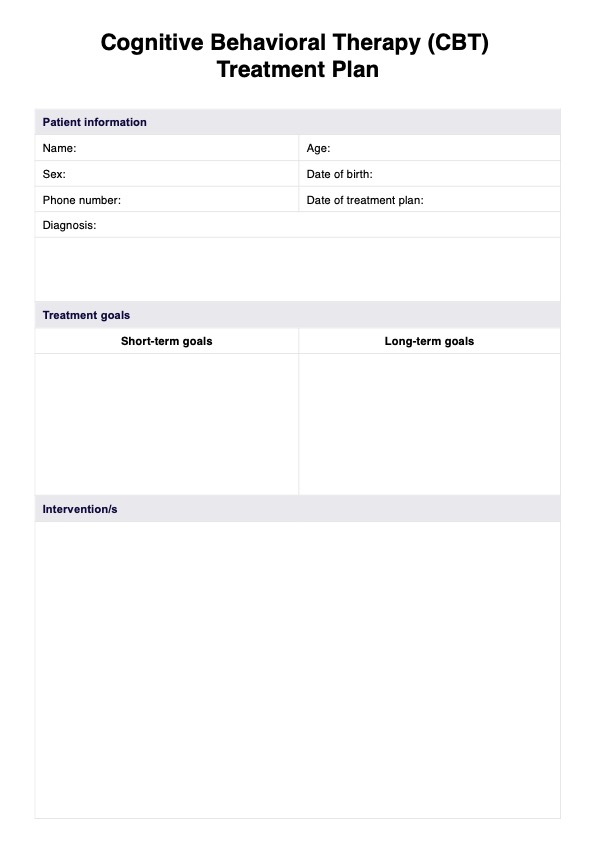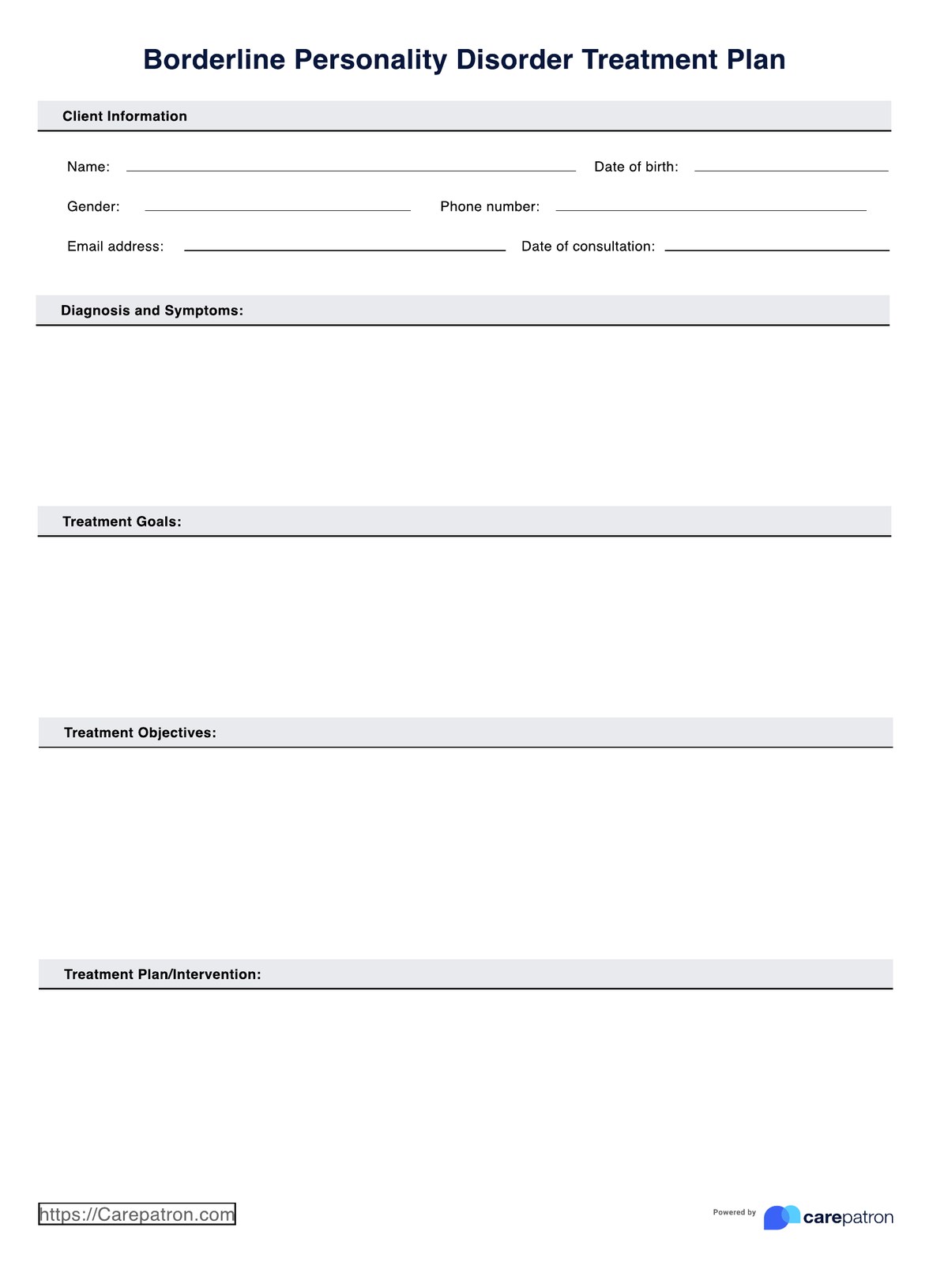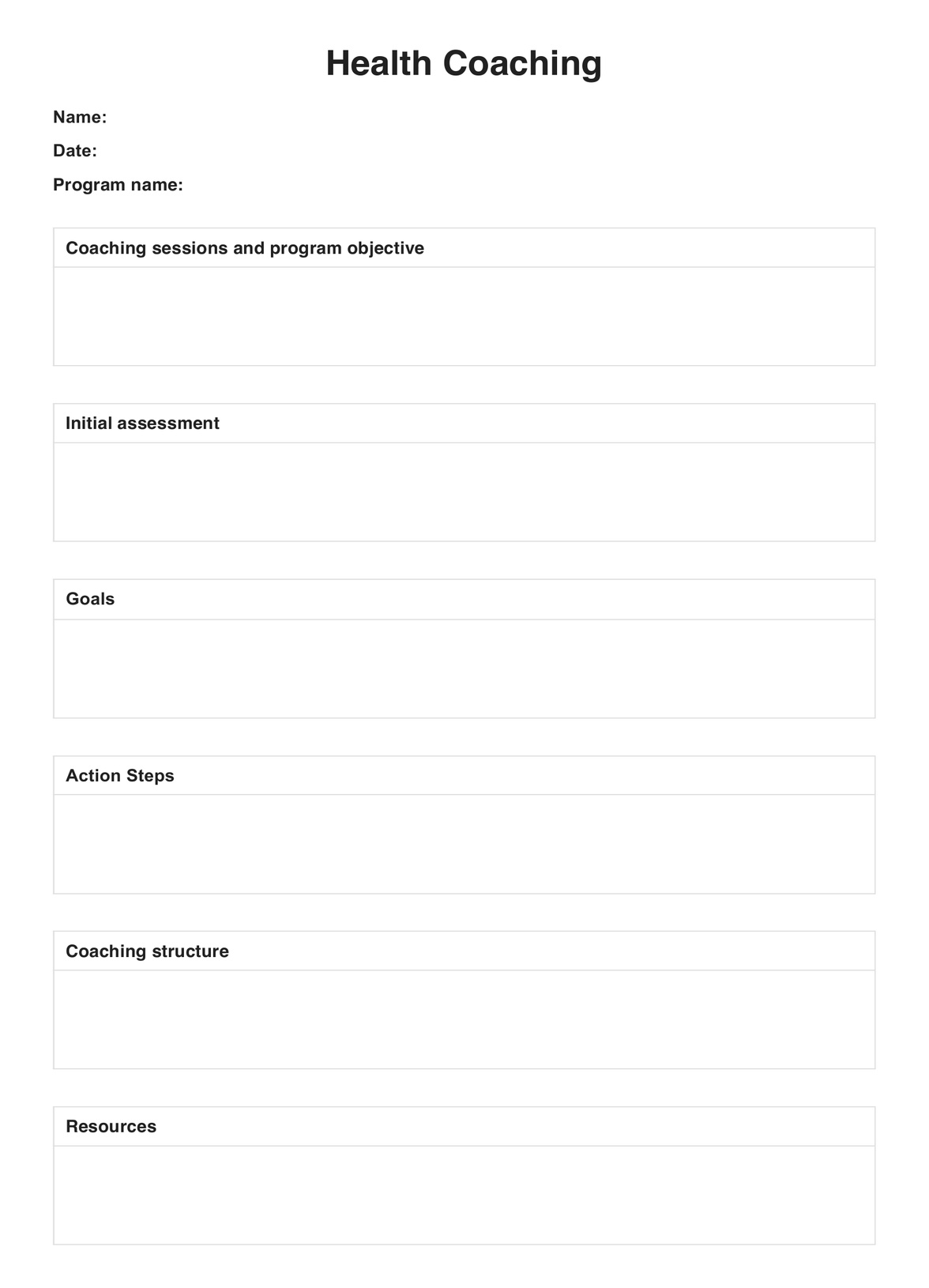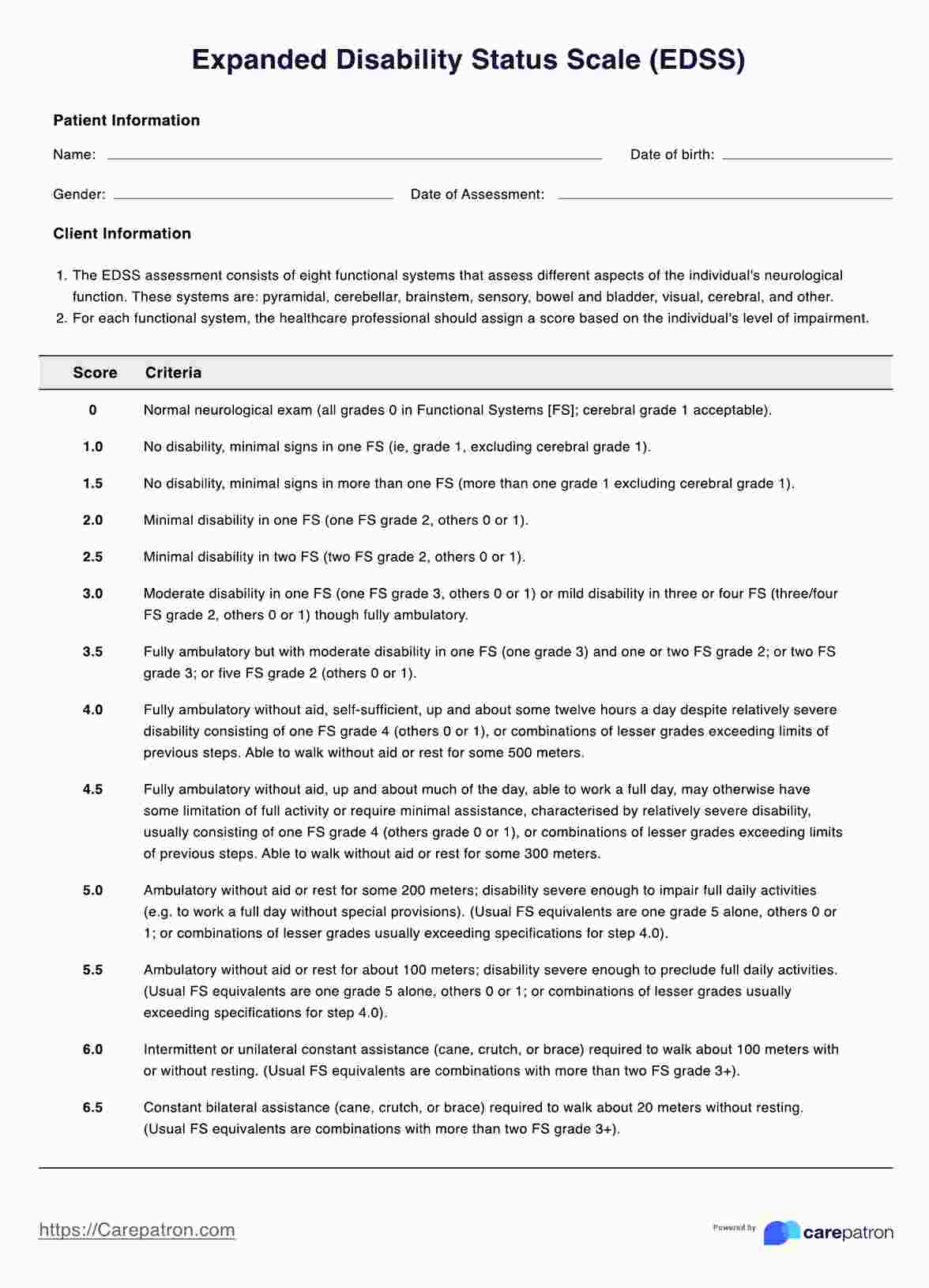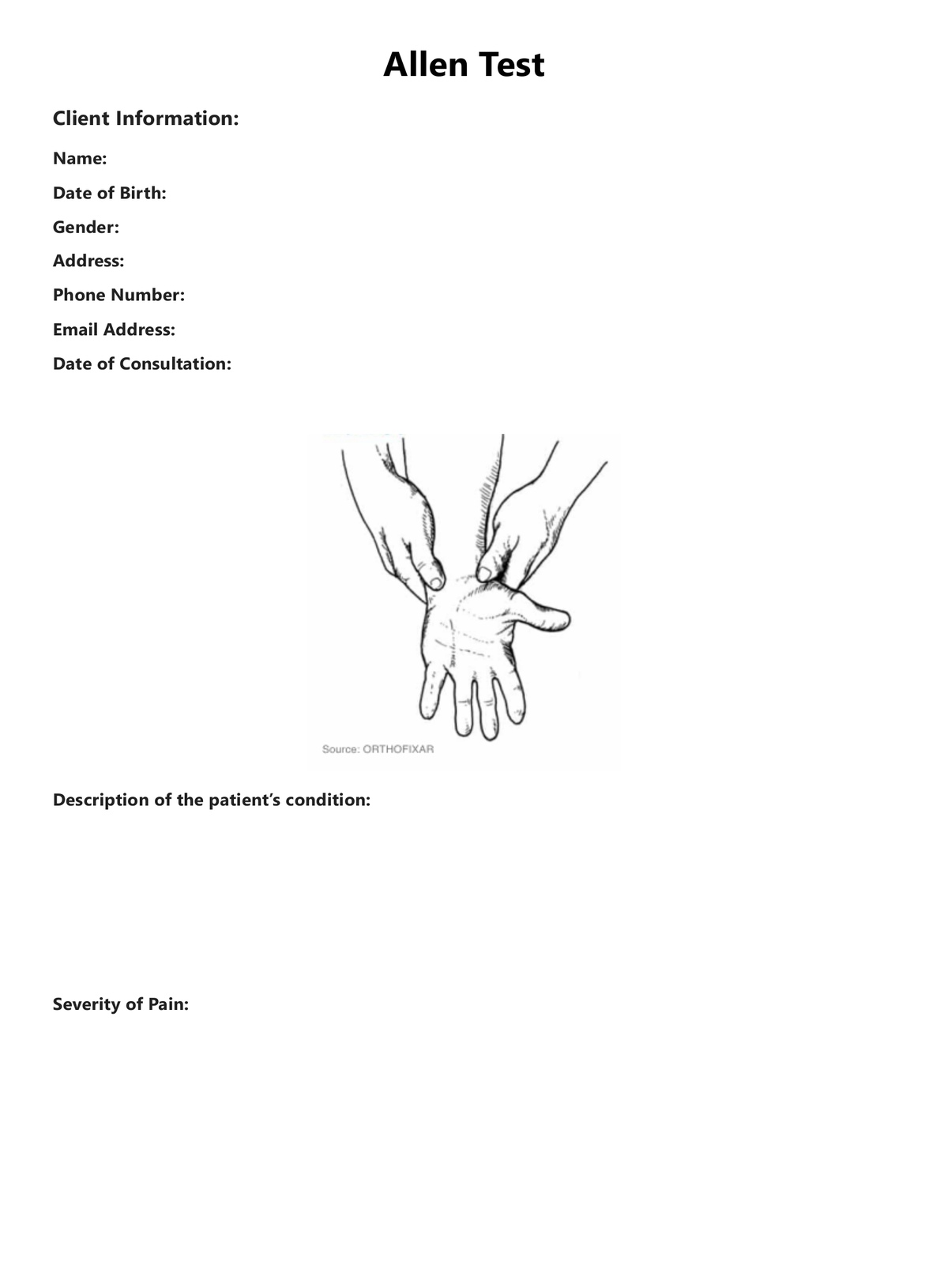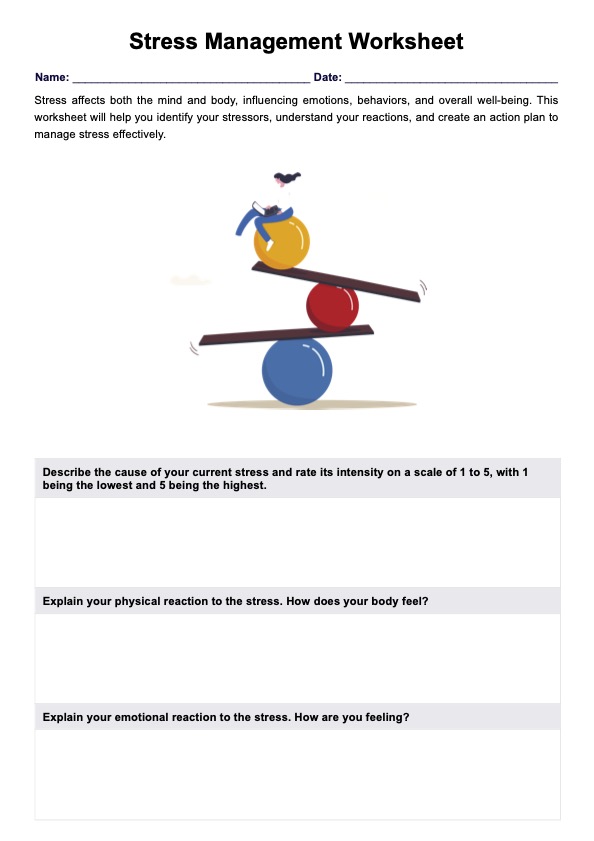MIND Diet Plan
Download our MIND Diet Plan Template to help clients reduce health risks and improve brain health. Get a free PDF copy.


What is a MIND Diet Plan Template?
The MIND Diet Plan Template is a resource designed to simplify the MIND diet, otherwise known as the Mediterranean-DASH Diet Intervention for Neurodegenerative Delay (MIND Diet). The MIND diet pulls food items from the DASH and Mediterranean diet, focusing on targeting the health of the aging brain. It has shown benefits for slower cognitive decline and brain protection (Harvard T. H. Chan School of Public Health, 2022; Higuera, 2022).
The healthy items that the MIND diet guidelines suggest include (Harvard T. H. Chan School of Public Health, 2022):
- 3+ servings a day of whole grains: e.g., whole wheat bread, brown rice, whole wheat toast
- 6+ servings a week of leafy greens: e.g., kale salad, lettuce, spinach
- 5+ servings a week of nuts: e.,g. almonds, cashews, pistachios
- 4+ meals a week of beans: e.g., kidney and black beans
- 2+ servings a week of berries: e.g., blueberries, raspberries, frozen fruit
- 2+ meals a week of poultry: e.g., grilled chicken, turkey
- 1+ meals a week of fish: e.g., tuna, grilled salmon
- Mainly olive oil, if added fat is used
Consumption of unhealthy items is recommended as follows:
- Less than 5 servings a week of pastries and sweets
- Less than 4 servings a week of red meat
- Less than one serving a week of cheese, fried, and processed foods
- Less than 1 tablespoon a day of butter/stick margarine
These brain-healthy foods contain vitamins that are known to reduce oxidative stress and brain inflammation. This helps reduce the risks and symptoms of Alzheimer's disease and other conditions related to cognitive decline among older adults (Morris et al., 2015).
MIND Diet Plan Template
MIND Diet Plan Example
How does it work?
The MIND Diet Plan Template provides a user-friendly, comprehensive framework for patients. It includes recommendations and a 7-day customizable template, allowing individuals and health practitioners to develop a personalized healthy eating diet plan.
Here are some steps to guide you:
Step 1: Download the template
You can access the MIND Diet Plan Template by clicking "Use a template. " This will allow you to edit the resource via the Carepatron app. To download a PDF copy, choose "Download."
Step 2: Patient consultation
Complete relevant patient measurements such as cognitive screening, weight, and blood pressure. Discuss the patient's needs and preferences regarding food and beverage items.
Step 3: Developing a plan
Construct a meal plan in the fillable 7-day section, ensuring that it aligns with their health goals, needs, and personal tastes while adhering to the MIND diet recommendations.
Step 4: Ongoing monitoring and support
After patients adopt the MIND diet, practitioners should schedule follow-ups for ongoing support, including annual cognitive tests, addressing concerns, and updating meal plans to track progress and manage cognitive health proactively.
When would you use the MIND Diet Plan Template?
Our MIND Diet Plan Template is typically used by health practitioners seeking to reduce the risks and effects of cognitive decline experienced by older adult patients and support healthy living.
The following are a few scenarios in which this template may be used:
Daily care plans
For patients experiencing dementia-related diseases, like Alzheimer's disease, healthcare providers may use this template within a broader care plan. This may provide structure for patients and reduce brain inflammation, reducing risks of further cognitive decline.
Primary prevention plans
Primary health care providers such as general practitioners may incorporate this template as part of their patient's primary prevention plan, particularly for older adults at risk of cognitive decline.
Increased adherence
The template breaks down the Mediterranean-DASH intervention diet into simpler, manageable steps to increase adherence to the diet plan. This is particularly beneficial for older adults in the initial phases of cognitive decline, who may require more structure to inform habits.
Potential results and benefits
Individual results may vary depending on several influencing factors when following the MIND Diet Plan Template. These may include genetics, the stage of cognitive decline, and current health status.
Here are some typical experiences and how they may affect an individual:
- Reduced risks of Alzheimer's disease: The MIND diet focuses on consuming foods that have been shown to enhance brain health and slow cognitive decline. Researchers found a lower rate of Alzheimer's disease among older adults who followed the MIND diet; even in cases of only moderate adherence to the diet, there was still evidence to support a reduced risk (Kheirouri, 2024; Morris et al., 2015).
- Protection of brain: The MIND diet contains foods rich in certain vitamins, carotenoids, and flavonoids. These have been shown to reduce oxidative stress and brain inflammation, supporting a healthy brain (Harvard T. H. Chan School of Public Health, 2022).
- Increased lifespan: Studies have shown that close adherence to the MIND diet can reduce the risk of dying from all causes. Those in the top third of adherence to the diet had a 37% lower risk of death compared to those in the bottom third (Corley, 2022).
- Reduced risks of Parkinson's disease: Following the MIND diet can reduce the risk of developing signs of Parkinsonism, such as motor impairments, spinal rigidity, tremors, and gait abnormalities (Agarwal, 2018).
- Reduced risks of chronic illness: The MIND diet, adapted from the DASH and Mediterranean diets, aims to reduce chronic inflammation and the onset of chronic illnesses. As a result, it may also reduce the development of chronic illnesses like cardiovascular disease and diabetes (Harvard T. H. Chan School of Public Health, 2022).
- Healthy weight loss: When used in conjunction with a balanced plate guide, it can promote healthy weight loss (Harvard T. H. Chan School of Public Health, 2022).
References
Agarwal, P., Wang, Y., Buchman, A. S., Holland, T. M., Bennett, D. A., & Morris, M. C. (2018). MIND diet associated with reduced incidence and delayed progression of Parkinsonism in old age. The Journal of Nutrition, Health & Aging, 22(10), 1211–1215. https://doi.org/10.1007/s12603-018-1094-5
Corley J. (2022). Adherence to the MIND diet is associated with 12-year all-cause mortality in older adults. Public Health Nutrition, 25(2), 358–367. https://doi.org/10.1017/S1368980020002979
Harvard T. H. Chan School of Public Health (2022). Diet review: MIND diet. The Nutrition Source. https://www.hsph.harvard.edu/nutritionsource/healthy-weight/diet-reviews/mind-diet/
Higuera, V. (2022). The MIND Diet for Alzheimer's Prevention. Everyday Health. https://www.everydayhealth.com/diet-and-nutrition/diet/mind-diet-can-this-diet-plan-help-reverse-alzheimers-disease/
Kheirouri, S., Valiei, F., & Taheraghdam, A. A. (2024). Association of plant-rich dietary patterns of Mediterranean and MIND with risk of Alzheimer disease. Human Nutrition & Metabolism, 37, 200283. https://doi.org/10.1016/j.hnm.2024.200283
Morris, M. C., Tangney, C. C., Wang, Y., Sacks, F. M., Bennett, D. A., & Aggarwal, N. T. (2015). MIND diet associated with reduced incidence of Alzheimer's disease. Alzheimer's & Dementia, 11(9), 1007-1014. https://doi.org/10.1016/j.jalz.2014.11.009
Commonly asked questions
Yes, eggs are allowed on the MIND diet, but they should be consumed in moderation.
The MIND diet focuses on plant-based foods, whole grains, healthy fats, and fish while limiting red meat, butter, and fried foods.
MIND Diet Plan Templates are used in consultation between health practitioners and their patients as an approach to the MIND diet. This is typically introduced as a primary intervention strategy to reduce the risks of developing cognitive decline and dementia-related conditions like Alzheimer's disease.


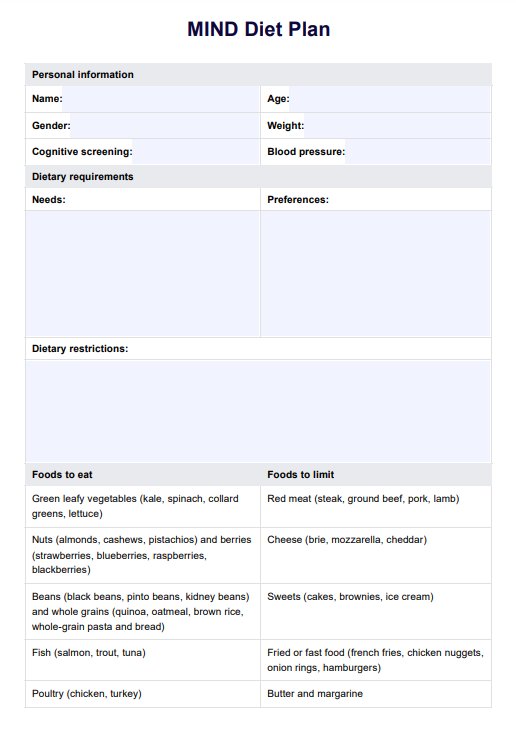
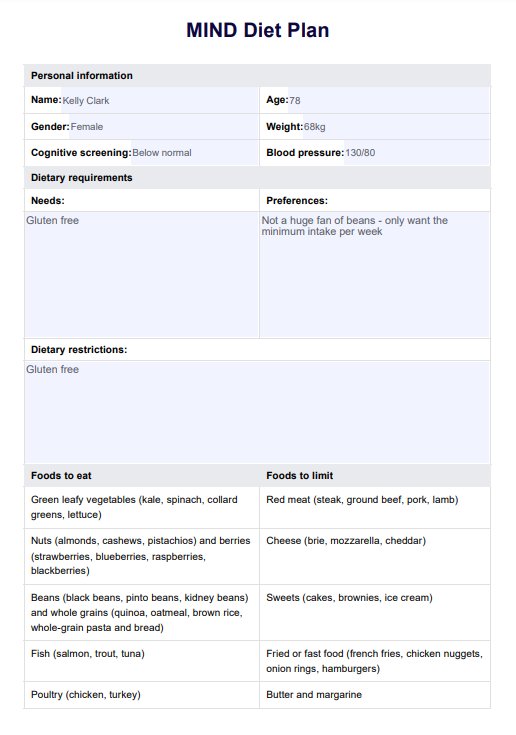

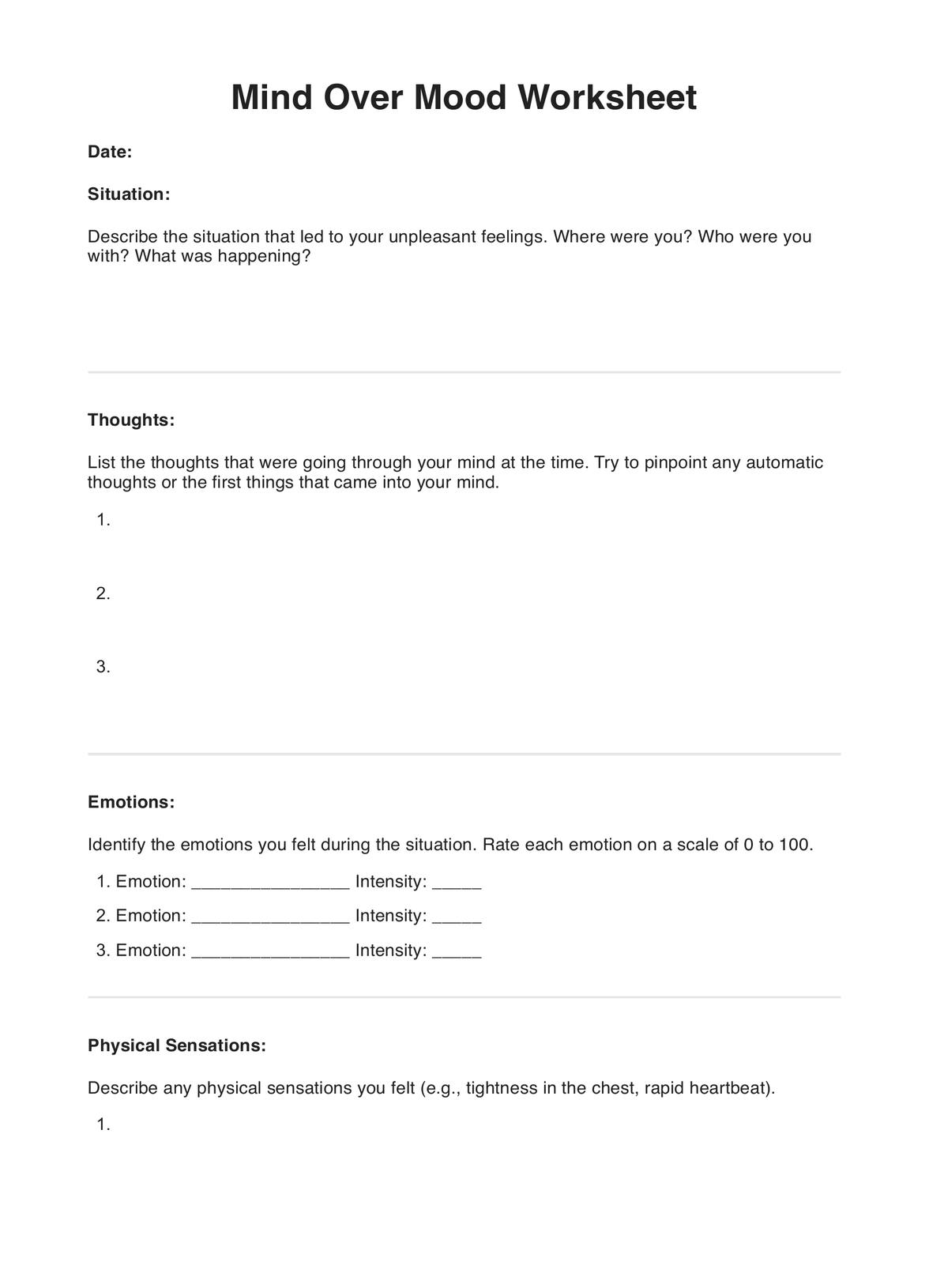
















-template.jpg)



















































































